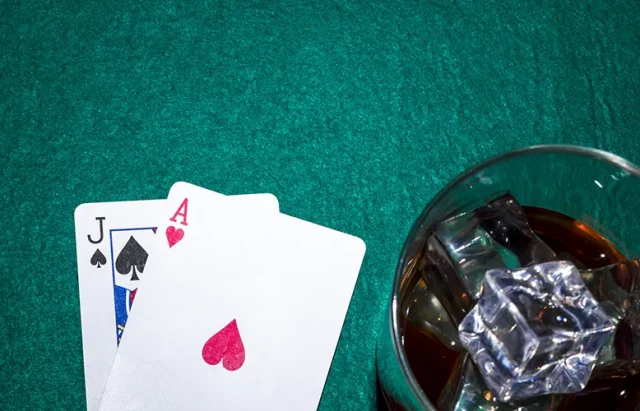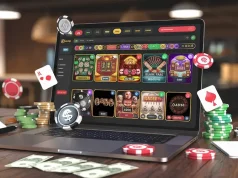
At first glance, blackjack looks simple. Get as close to 21 as you can without going over. Easy, right? But the moment you sit down at a table—whether it’s online or in a smoky casino—you’ll notice something else: most players aren’t winning. Why? Because they keep making the same mistakes over and over. If you’re new to blackjack and think it’s all luck and gut feelings, you’re already down a few chips. This guide breaks down the most common beginner blunders—and how to fix them—so you can play smarter from your very first hand.
Mistake #1: Trusting Instinct Instead of Strategy
Blackjack is one of the few casino games where math—not gut feeling—can actually give you an edge. But new players often ignore the numbers and play based on hunches. That’s where things start to unravel. It’s not only about the exact casino software, but also about your ability to think rationally in the moment.
Hitting or Standing at the Wrong Time
- Beginners often stand too early
Holding a 13 against a dealer’s 10 might feel safe, but it’s actually a mistake. The dealer has strong odds to beat that hand. You’re better off hitting—even if busting is possible. - Or they hit when they should stand
If you’ve got 17 and the dealer shows a 6, you should hold. The dealer is more likely to bust—but many newbies panic and hit anyway. - The fix: learn basic strategy charts
These charts tell you exactly what to do in every situation based on your hand and the dealer’s upcard. Memorize the basics. Print one out. Keep it nearby. It’s not cheating—it’s smart.
Thinking the Dealer Plays Emotionally
- The dealer doesn’t “choose” to hit or stand
Unlike poker or slots, the dealer follows strict rules. There’s no bluffing or emotion in play. They must hit until 17 or more. Knowing that helps you focus on your own moves. - It’s not personal
The dealer didn’t hit just to beat you. If you lost, it wasn’t a setup. Don’t let emotions cloud your decisions in the next round. - The fix: detach your ego
Play the math, not the moment. Your job is to make the most statistically correct move—every single hand.
Misreading What “21” Really Means
- You don’t have to reach 21 to win
If the dealer busts and you’re sitting on 12, you still win. Many beginners keep chasing a perfect hand when patience would have paid off. - The fix: know when to stop
Sometimes “good enough” is exactly right. It’s not about building the best hand—it’s about beating the dealer’s.
Mistake #2: Mismanaging Money from the Start
You can play the perfect hand and still lose. Blackjack swings hard sometimes. That’s why managing your bankroll is even more important than knowing when to split your eights. If you’re betting without a plan, you’re not playing—you’re just hoping.
Betting Too Much, Too Soon
- A big bet feels exciting—until it doesn’t
New players often throw down large bets on their first few hands, hoping for quick wins. When those don’t come, they’re rattled. - The fix: bet small while you learn
Treat your first games like practice. Keep bets low and focus on getting comfortable with the rhythm.
Chasing Losses
- Trying to “win it back” leads to worse decisions
One bad hand turns into two, and suddenly you’re betting double to break even. This is how you empty your wallet fast. - The fix: set limits before you play
Have a stop-loss amount. If you reach it, walk away. No exceptions. Gambling discipline doesn’t start at the table—it starts before you sit down.
Ignoring Table Minimums and Payout Rules
- Not all tables are equal
A table that pays 6:5 on blackjack instead of the classic 3:2 is quietly robbing you. Same goes for high minimums that drain your bankroll faster. - The fix: scout your table first
Look for 3:2 payout tables. Lower minimums help you play longer. If the rules feel confusing, ask the dealer—or move on.
Mistake #3: Misunderstanding Splits, Doubles, and Soft Hands
Once you’ve mastered the basics, these “in-between” moves make or break your game. And beginners? They often skip them altogether—or use them at the wrong time.
Not Splitting (or Splitting Everything)
- Always split aces and eights
Two eights add up to 16—a terrible hand. Split them and give yourself a shot at two stronger hands. - Never split tens or face cards
You’ve already got 20. That’s gold. Don’t break it up just to gamble on something worse. - The fix: follow the split chart
It’s not a guessing game. The odds are already calculated. Use them.
Forgetting to Double Down
- Doubling is a power move, but only in the right spots
You double your bet—and get just one more card. You’re in a strong position if you’ve got 11 and the dealer shows 6. Take the shot. - Beginners often miss these moments
Fear of losing more keeps them from capitalizing on the best edge they’ll get. - The fix: look for key double-down hands
Especially 9, 10, or 11 when the dealer shows a weak card (2 through 6).
Misplaying Soft Hands
- An Ace and a 6 is soft 17—not a guaranteed stand
Because that Ace can be 1 or 11, you’re more flexible. It’s often right to hit a soft 17 if the dealer’s showing strength. - Soft hands give you options—but require confidence
Most players treat them like hard hands and miss their advantage. - The fix: understand soft hand strategy
Study how soft hands play differently. They offer some of the best long-term value—if you handle them correctly.
Conclusion
Blackjack isn’t about playing perfectly every hand. It’s about avoiding the worst mistakes consistently. Skip the guesswork. Forget the hunches.
Learn the moves that shift the odds in your favor—and use them purposefully. Whether you’re playing online or in person, the players who stay calm, follow strategy, and manage their bankroll tend to walk away happier. So before you sit down and start slapping chips on the table, take a beat. Learn the basics, avoid the traps, and treat every hand like a learning opportunity. That’s how beginners become real players. Finally, if you are ready to try blackjack now, then look no further than the following article!





